- Home
- Tim Lebbon
Pieces of Hate Page 3
Pieces of Hate Read online
Page 3
His horse was gone. I had not even noticed its absence on the way over from my store. Someone must have come by during the day and dragged it away, along with the dead dog. I wondered where it was now, and I had a sudden image of the horse rising, the hound standing up, squatting and licking its balls as I approached to hear whatever it had to say . . .
I’d drunk more whiskey than I was used to and it was time to go home. But home—a place of supposed security, where Indians couldn’t reach and bandits were kept away by the notion of safety—was somewhere I would never reach again. That night, everything changed forever.
Gabriel came out of the dusk. His face was black with blood but his one good eye sparkled, as if catching the sunset all for itself. “You!” he said.
I was in no state to run, and I knew it would do no good. So I leaned against the wall of the livery stable and let him come to me. He moved through the shadows as if they were his own.
“I need you to relay a message,” he said.
“What message? For who?” But I already knew where I would be going that night.
“Go to Temple. Tell him I’m here. He knows already, but I need to challenge him on my terms, at a place of my choosing. Tell him . . . tell him I’ll meet him in your store.”
I closed my eyes and felt the world sway, not only from the effects of alcohol. Fear had me in its grasp. I had already seen what Temple had done to Jack, the madness implanted in his mind. I had no wish to go that way myself. Everything was becoming so strange.
“If I don’t go?” I said.
“You will,” Gabriel said.
I knew that I had no choice.
Old Man Newman’s place was tucked around the back of town, hidden away from the main street by the Deadwood Hotel and the stables. I guess even in a place like Deadwood people did not want the business of death in plain view.
It was dark around there. On the main street there were lanterns, and light spilled from various buildings to keep the night at bay. But behind the hotel there was only moonlight, and a faint glow from one single lit window. I looked up and wondered who was behind the glass, what they were doing. Maybe it was Wild Bill Hickok’s room and he was sitting there now, oiling his guns, practising his card shuffles, thinking about going down to the saloon for a game, dwelling on the times he had killed and all the killing still to come.
Newman’s Undertaker’s stank of death. It was not rot or decay or dried blood, but a more subtle smell that everyone in town associated with his business. We often saw him riding his meat wagon along the main street with another delivery for Mount Moriah Cemetery. Sometimes folks followed on behind, mourning a mother or daughter, father or son. Just as frequently there were maybe only one or two mourners, following another drifter or gunfighter to their final resting place. The smells that accompanied that sight were distinctive and redolent of Newman’s profession: his groomed horse sprayed with some perfumed concoction of his own making; the whiff of flowers from those funerals where people cared; the grease from Newman’s hair, a special type he had imported from Paris via my store; and on occasion a hint of the chemicals he used to treat the bodies if their family or friends wanted to say their final good-byes.
I smelled all that and more, and it reminded me of Gabriel’s breath.
I glanced up at Newman’s living quarters above the place of business. There were no lights on up there, and though I could not recall seeing him in the saloon that was likely where he was headed. I found the door handle, turned it and walked inside.
Sober now—the effects of the whiskey long since driven out by fear—I closed the door and tried to let my senses adjust. It was utterly silent, without even the ticking of a wood burner. The odour was worse in here and more base, the true stench of Newman’s profession: rot. There was a body somewhere, and the last thing it had to give to the world was a bad smell.
I stepped forward. A floorboard creaked and it was like a gunshot in the dark. Something scurried across the floor, startled by the noise, and I held my breath until the tiny footfalls faded. My heart sounded loud to me, surely anyone in the dark would hear it too? I moved forward again, wondering just what the hell I was going to find in here. How could I give a message to a dead man? But Temple was not dead, Gabriel had told me that, as had Jack. Whether or not Old Man Newman knew the truth I would find out soon enough.
My head bumped a lamp and set it swinging on its hook. It squeaked back and forth until I reached up and held it still. The glass was warm. I found my matches, closed my eyes against whatever I was about to see and lit the lamp by touch.
“Burning bright tonight,” a voice drawled, and it was a blunt blade in my brain, a sweet taste on my tongue. How a voice could inspire two such opposing reactions I did not know, but when I opened my eyes I was alone in the room.
Alone, but for Newman’s corpse spread-eagled across the timber boards.
I gasped and stepped back, knocking the lamp, setting shadows dancing in rhythm. The shifting light wavered across Newman’s tortured corpse like a soothing hand. But nothing could temper the look of frozen terror on his face. Shadows hid in wrinkles on his face, and his open mouth was deep and black with the dying scream he had never uttered.
“Ahh, what scared him,” the voice said, and it was a statement more than a question.
“Who’s there?” I hissed. “Who?” But there was no answer.
I was going to leave. I would spin around, haul open the door and flee into the safe night, away from that place of death, away from the twisted terror on Old Man Newman’s face. Perhaps out there in the dark I would run into Gabriel, and he would understand, surely, he would forgive me for not delivering his message to the supposedly dead-but-alive Temple?
My indecision was resolved for me. I saw the coffin across the room, resting on a wooden table. I sensed that it was full. And as the dead grey hand rose into view, that voice spoke again.
“So what scares you?”
The hand opened.
Temple held my greatest fear up to view. I forgot about Newman’s corpse, forgot about Gabriel and his message. All my attention was focussed on the face of my father where it floated above the corpse’s outstretched palm. His hair was grey—it was him as an old man, just before he died—but his eyes were still cruel, their intent to hurt, the knowledge of past pains black seeds in their depths, as if the torturing of my childhood mind and body had planted new life within him. Memories flooded in, smells and sounds and feelings; his fists pummelling my ribs and the tang of my own blood; his boots connecting with my weak hips, and his grunting from the effort.
I screamed, but Temple only sat up and laughed. I fumbled for the door latch behind me, backing up, unable to tear my gaze away from my dead father’s image where it floated above the coffin. And as I tore my eyes away, I saw that Temple had Jack’s face.
I think I ran for a long time. Dawn was haemorrhaging across the horizon by the time I came to my senses, and I may have been running all night, aimless in the dark, hiding beneath a house; I simply did not know. I was exhausted and shaking, bloodied and bruised from falls.
I reached my store before much of the town had risen, glancing over my shoulder towards where Old Man Newman’s place hid behind the hotel and stables. I was not entirely sure what I expected to see; I was uncertain, in fact, of what I had seen. Jack in a coffin? But it had not been Jack, whether it had his face or not. Those eyes had been far too old. And unlike Jack’s cross-eyed squint, they had stared straight at me.
Gabriel was waiting inside. He seemed surprised to see me.
“Let you go?” he said.
“I ran.”
“Even so, it’s unusual.”
“You expected him to kill me?”
“I’m glad he didn’t.” Gabriel was oiling his Peacemakers, turning them gently like newborn babies.
“But you sent me there to die?”
He looked up. In his one good eye I saw so much conflict: pain and sorrow; fear and heartache. “Y
ou were the message,” he said. “You were the test. You escaped because he’s still slow. He has to sleep sometimes, regain his strength. Time . . . it’s wearing.” His own haggard face testified to the truth of his words.
“He killed Old Man Newman,” I said.
“An old man. Did he ask what scared you?”
“He showed me.”
“Oh.” Gabriel carried on oiling his guns. If he was waiting for me to reveal what I had seen, he was disappointed.
“He was . . .” I started, trying to think back, desperate not to. He was Jack? Was that what I was going to say?
“Temple is many faces but only two men,” Gabriel said. “Whatever you saw, he fooled you.”
“Two men?”
“He’s the Twin.” He stood then, holstered his guns, looked around the store as if browsing for something unattainable. His gaze rested on me, and for the first time a smile cracked his face. There was no humour there; history, for Gabriel, was joyless. “Thank you for your help,” he said. “I’m going to try to kill him again now.” And he left my store without another word.
I went to the window and watched him stroll slowly up the street. His long coat was tied back from his sides, making it easier for him to draw should the need arise. I thought of the trouble I had seen in this town—killings, knifings, fights in the saloon, a gun battle in this very street just the summer before which had left six men bleeding into the dust—and I realised then just how different this was. Gabriel was not here to avenge some nebulous crime, nor to hunt down a common criminal. There was much more to the fight between these two men than I could ever hope to understand.
I tried. I had a pretty good imagination, able to shift myself away from the confines of my simple existence. But Jack’s face rose to haunt me from every daydream, both cross-eyed and straight-eyed, and I knew that Temple was way beyond my comprehension. As though fear held me tight like a mouse in a rattler’s jaw, I watched Gabriel disappear around the side of the hotel knowing that I would never witness anything like this again. Things had changed last night—my belief in reality, my certainty in what was real and imaginary—and I had just let the possible answer walk away.
I ran to the counter, hefted my shotgun and rushed out into the street. I had seen plenty of trouble in Deadwood. This morning, I would be in the thick of it.
I passed several people on the way to the hotel, most of them prospectors I recognised from the saloon. They saw the shotgun and looked away. I ignored them and hurried on.
Gabriel had disappeared. I moved carefully along the side of the hotel, stepping through a knee-deep pile of rubbish that was slowly rotting into the ground. My feet kicked up an horrendous stench but I kept facing forward, eyes on the corner of the hotel, counting down the seconds until the funeral parlour came into view.
Ten seconds. A dog barked behind me, someone shouted at it to shut up. Eight seconds. A window opened in the hotel above my head, though I could not tell whether anyone was looking down. Six seconds. Something screeched as my boot crunched down. I pressed harder to hasten its end and quell its squeal. Four seconds. I cocked the shotgun. It had never shot a man.
Two seconds. One. I did not pause.
Gabriel was standing with his back to the open doors of Old Man Newman’s funeral parlour, looking around, guns held loosely by his side. He saw me almost immediately, raised his revolvers a few inches, came forward and stared at my face. “No,” he said, “it’s only you.”
And then something blacked out the sun.
The shape came from above and struck Gabriel like a sack of grain. It crushed him to the ground—I heard bones breaking, skin tearing—and rolled quickly away, a whirl of limbs and claws and mud. Gabriel groaned and tried to stand, but I had already stepped over him and levelled the shotgun. As my finger squeezed against the trigger the shape slowed, stood and revealed itself to me.
It was Temple. But not the Temple I had seen in the coffin, that impersonator of my friend Jack. This thing was everything Gabriel had described: dead but living; evil and old; the Twin. His face was insubstantial, flitting from man to boy, black to white, clear and shadowed. Each time I thought I had a feature pinned down he changed again. He had a big nose . . . but no, it was small. He had a heavy beard . . . but suddenly it was gone, and in its place was the pimpled skin of a teenager.
Gabriel tried to speak behind me, but his face was too smashed in.
Temple raised his hand and opened it, palm up.
Gabriel squealed.
“What—?” Temple asked, but my shotgun cut him off.
I shot a dog once, when I was a farmer and found the mad hound worrying my employer’s cattle. I had never been a very good shot, and the bullet passed through its shoulder without killing it outright. It fell to the ground and squirmed its life away in the dust. Took about an hour, maybe more. The noises it made—squeals of pain, growls of disbelief—ensured that I did not move closer to finish the job.
The sound that came from Temple’s mouth was ten times worse.
I fell to my knees and covered my ears, dropping the shotgun, closing my eyes, as if being blind would detract from the noise. I felt Gabriel grab my coat as he tried to haul himself up, but all my attention was focussed on the dark shape of Temple, rolling and squirming in the mud. I had hit him. I had shot him! And now mud and horse shit was mixing into his wounds, his blood was pouring out, and the terrifying thing he had been was little more than a gut-shot dog.
Gabriel had stood by leaning against my braced back, and now he tried to whisper in my ears
I could not hear him. Temple was screaming.
Gabriel’s leaned closer, the stench of decay rich on his breath, and for the first time I actually wondered just what in Hell he was.
“It’s all . . .” I did not hear the full sentence. Temple’s scream changed so quickly into a wild, mocking laugh that I stood and looked around, expecting to see someone else watching us from the shadows.
“It’s all a game,” Gabriel said.
I fell to the ground and reached for the shotgun, but something struck me across the side of the head, stamped on my chest, grabbed my arms, lifted me and crashed me into the hotel wall. Timber splintered and tore through my clothes and into my flesh. Temple twisted and crushed me there, pinning me like a buffalo skin hung out to dry. Shock held the pain at bay but I knew it would flood in soon.
The laughter continued. The shadow of Temple turned away as if I was as much threat as a fly.
Gabriel stood. His bones were broken—I saw shiny white protuberances on his leg and beneath his long coat—and his one eye was squinted with the pain. But still he stood to face Temple, one muddied Peacemaker in his hand. He raised it quickly, faster than anyone I had ever seen, only to have it knocked from his hand. With his back to me Temple punched down on Gabriel once, hard, and drove him back into the mud.
“I don’t need to ask what scares you,” I heard the Twin say, his voice both gentle and filled with rage.
Hanging there, shattered timber cladding sinking slowly into my flesh as weight pulled me down, I watched the fight begin. I saw the tall demon that had invaded our town drive his fists down onto Gabriel’s upturned face again and again, again and again, until it seemed that the one-eyed man was sinking into the ground. Each time I looked away from Temple and then back again, something about him seemed to change. His arms were longer, his fists smaller, his shoulders broader than they were before, and then they would change back. I closed my eyes briefly and the effect was the same. The only consistency lay in my own pain, and Gabriel’s obvious defeat. He was being crushed down, each blow seemingly hard enough to kill any normal man. I heard bones crunching; Gabriel’s cheeks, or Temple’s knuckles. I heard crying, or laughing. I saw two grinning faces and they belonged to the same impossible man. Neither of them was Jack and I thought back to what I had seen that evening, the body rising in the coffin, wondering whether I could have been mistaken.
I coughed and fell further on
to the wooden stakes. They would kill me. I felt their sharp points probing towards my organs, reaching for my heart, pricking my lungs and bringing blood to my breath. Pain clouded my vision, but then disbelief cleared my view.
A gunshot. Temple staggered back towards me, and before him Gabriel was rising to his knees, pistol in one hand, the other hand working its hammer again and again. Each shot lit the scene briefly like the sun blinking its eye. And each shot found its mark. Blood and bone splattered across my chest. Temple fell back until he was leaning at an impossible angle, so far over that I looked down at his upturned face. Gabriel stood fully and emptied his last chamber into his enemy’s stomach . . . and then the demon rose upright, winking at me as he went.
He shrugged. Coughed. Six bullets sprang from his flesh and splatted into the mud. I looked at Gabriel and saw no surprise in his expression. He returned my gaze, and in his eye I saw sad resignation.
How many times before? I wondered. How many fights to give him so many scars?
As pain finally took me away to somewhere safer, the last thing I saw was Temple adding a new scar to Gabriel’s body, and another, and another. I could not tell whether the scream that followed me into those darkened depths was my own.
Someone had lifted me from the broken hotel wall and dropped me into the mud. It had dried around my body and held me fast. It was still daylight, and the sun blazed down like liquid gold. My body was a map of pain, each district hurting in a slightly different way. My limbs ached; my head roared; my torso was on fire, each movement stoking the flames of agony. I cried out for unconsciousness, but it seemed my body had had enough of hiding away from the truth.
Everything was silent.
I opened my eyes and slowly, slowly sat up. Mud crackled as I pulled away from its embrace. My shirt was caked with dried muck. The blood was also dry; that was a good sign. No fresh bleeding might just mean that the wounds weren’t as bad as they could have been . . . should have been. I looked up at the side of the hotel and saw where I had been impaled like some sad collected insect. The shattered wood was black with my blood.

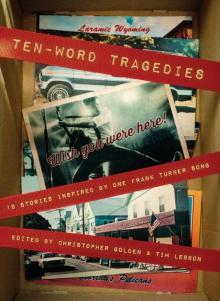 Ten-Word Tragedies
Ten-Word Tragedies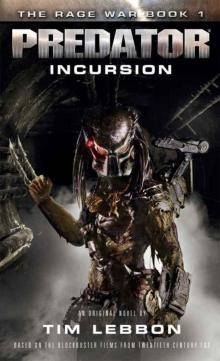 Predator: Incursion
Predator: Incursion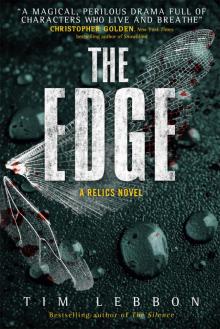 Relics--The Edge
Relics--The Edge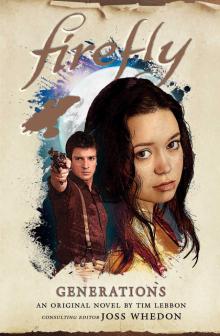 Firefly
Firefly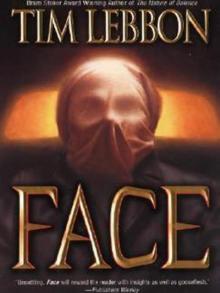 Face
Face Generations
Generations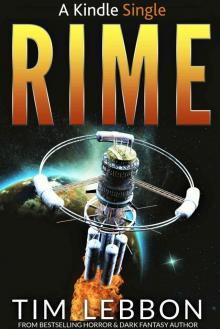 RIME (Kindle Single)
RIME (Kindle Single) Fallen
Fallen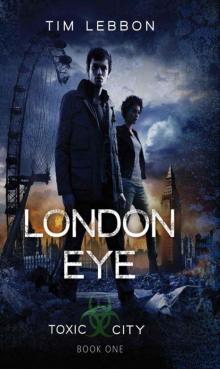 London Eye tc-1
London Eye tc-1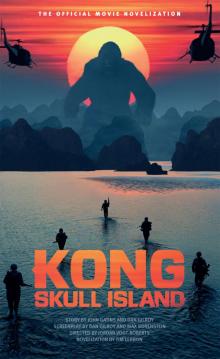 Kong: Skull Island
Kong: Skull Island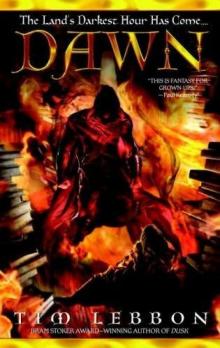 Dawn n-2
Dawn n-2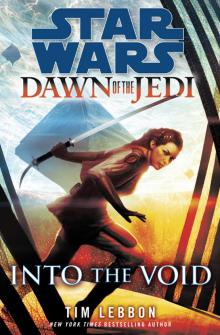 Into the Void: Star Wars (Dawn of the Jedi)
Into the Void: Star Wars (Dawn of the Jedi)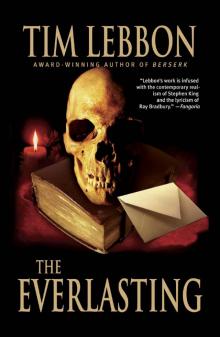 The Everlasting
The Everlasting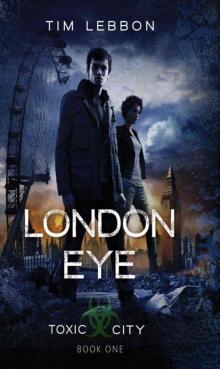 London Eye: 1 (Toxic City)
London Eye: 1 (Toxic City)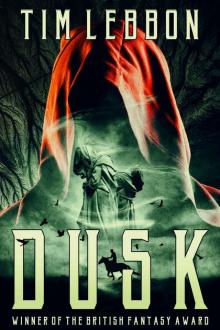 Dusk: a dark fantasy novel (A Noreela novel)
Dusk: a dark fantasy novel (A Noreela novel)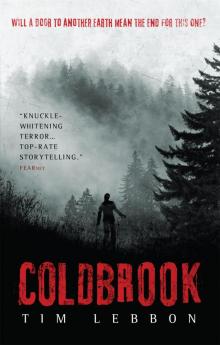 Coldbrook
Coldbrook Alien
Alien Dusk
Dusk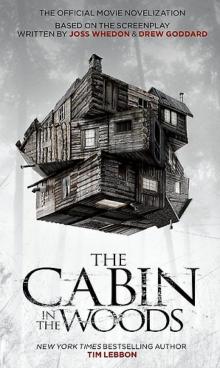 The Cabin in the Woods
The Cabin in the Woods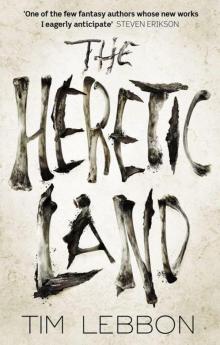 The Heretic Land
The Heretic Land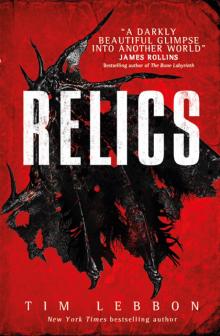 Relics
Relics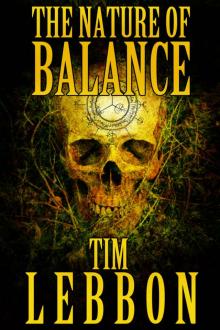 The Nature of Balance
The Nature of Balance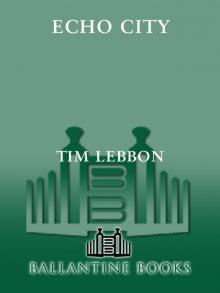 Echo City
Echo City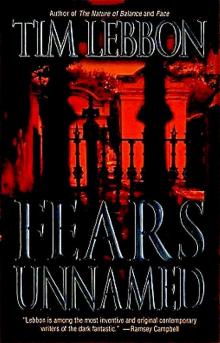 Tim Lebbon - Fears Unnamed
Tim Lebbon - Fears Unnamed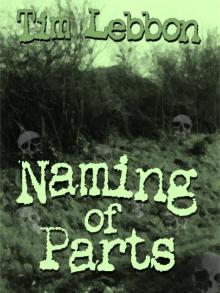 Naming of Parts
Naming of Parts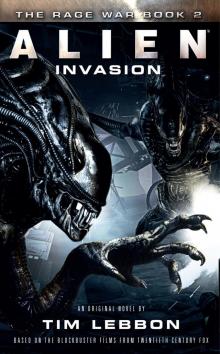 Alien--Invasion
Alien--Invasion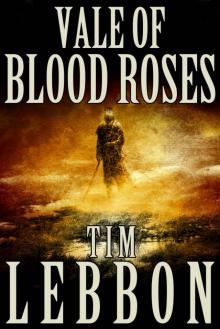 Vale of Blood Roses
Vale of Blood Roses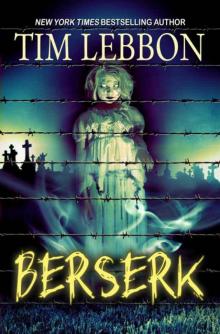 Berserk
Berserk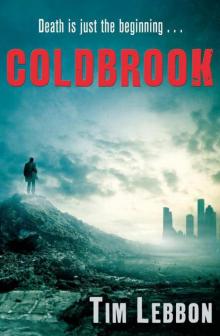 Coldbrook (Hammer)
Coldbrook (Hammer)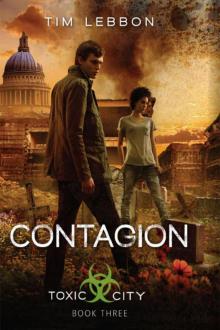 Contagion tc-3
Contagion tc-3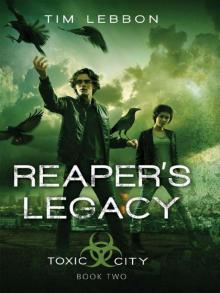 Reaper's Legacy: Book Two (Toxic City)
Reaper's Legacy: Book Two (Toxic City)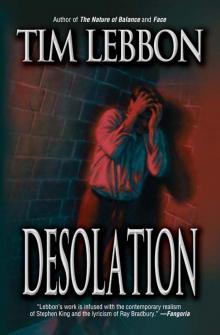 Desolation
Desolation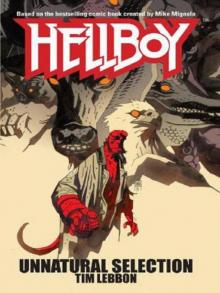 Unnatural Selection
Unnatural Selection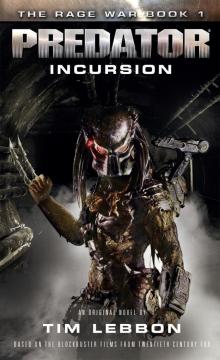 Predator - Incursion
Predator - Incursion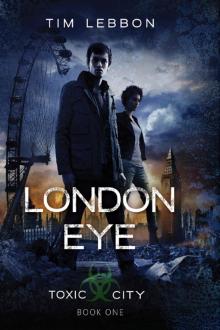 London Eye
London Eye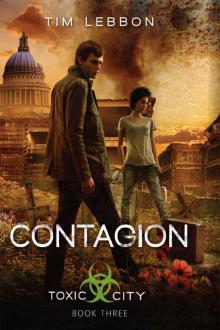 Contagion (Toxic City Book Three)
Contagion (Toxic City Book Three) The Silence
The Silence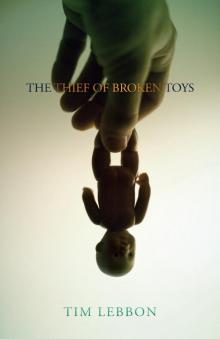 The Thief of Broken Toys
The Thief of Broken Toys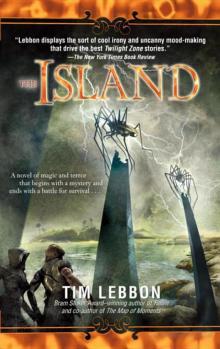 Tales of Noreela 04: The Island
Tales of Noreela 04: The Island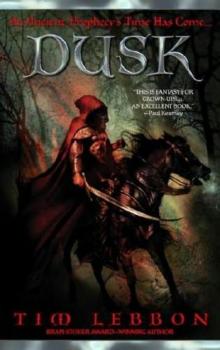 Dusk n-1
Dusk n-1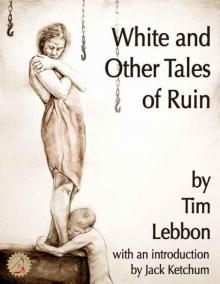 White and Other Tales of Ruin
White and Other Tales of Ruin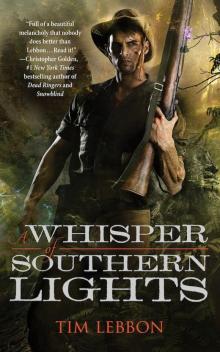 A Whisper of Southern Lights
A Whisper of Southern Lights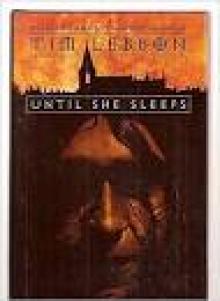 Until She Sleeps
Until She Sleeps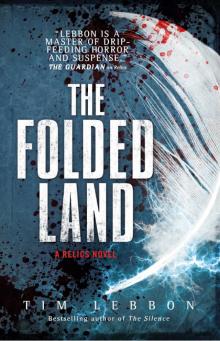 Relics--The Folded Land
Relics--The Folded Land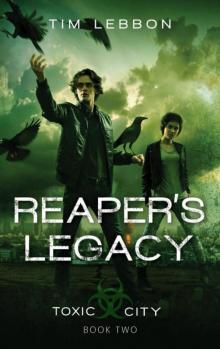 Reaper's Legacy tc-2
Reaper's Legacy tc-2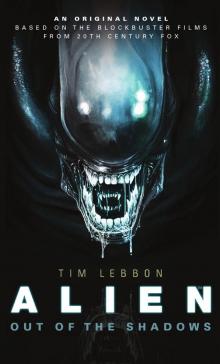 Alien: Out of the Shadows
Alien: Out of the Shadows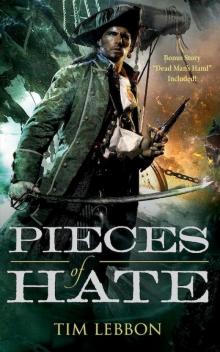 Pieces of Hate
Pieces of Hate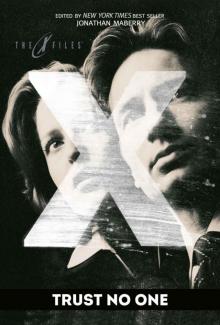 X-Files: Trust No One
X-Files: Trust No One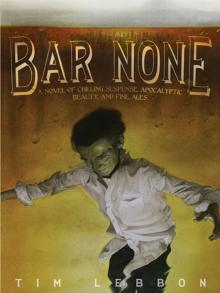 Bar None
Bar None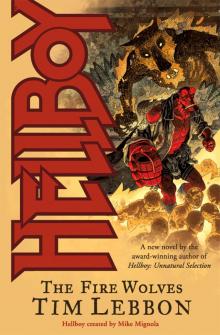 The Fire Wolves
The Fire Wolves